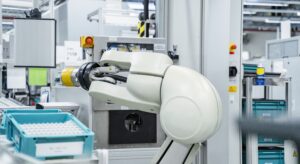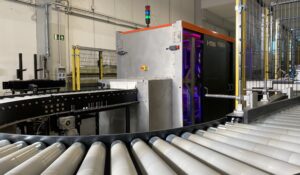Industrial robotics is undergoing an unprecedented transformation thanks to the combination of artificial intelligence (AI) and machine vision.
This revolution is not limited to improving productivity; it is also changing the nature of jobs in industry, creating the need for employees to acquire more sophisticated technical skills to manage and maintain automated systems. The combination of the Internet of Things (IoT), big data and predictive analytics is enabling companies to make informed and agile decisions based on real-time data. In this context, industrial robotics becomes a key player, capable of taking on complex and repetitive tasks, freeing humans to focus on activities that require creativity and critical thinking.
In this article we explore how these technologies are revolutionizing Industry 4.0, optimizing processes and redefining the interaction between machines and humans.
The Industry 4.0 revolution
In recent years, we have witnessed how Industry 4.0 is marking a milestone in automation and connectivity. The Internet of Things (IoT) makes it possible to monitor processes in real time, facilitating more accurate and predictive data analysis. This not only improves efficiency, but also enables machines to take on complex tasks faster and more accurately than humans.
The transition to a digital environment impacts not only production, but also business relationships and job roles, requiring employees with advanced technical skills.
Industrial Robotics Applications
Industrial robotics has evolved considerably over the past 40 years. Today, it is common to see:
- Robotic arms: These programmable mechanical robots perform repetitive tasks such as welding, assembly and packaging, improving the efficiency of production processes and reducing costs.
- Cobots: Designed to work alongside humans, these collaborative robots are safe and easy to program, allowing them to be integrated into work environments without the need for physical barriers.
- AGVs (Automated Guided Vehicles): Used mainly in logistics, these robots move autonomously, optimizing the transport of loads and improving operational efficiency.
- Drones: Although their use in industry is still limited, drones are gaining ground in the inspection of hard-to-reach areas, thanks to their ability to fly and perform quality control tasks.
The impact of Artificial Intelligence on Robotics
Artificial intelligence is transforming industrial robotics, enabling robots to adapt to and learn from their environment. Technologies such as Reinforcement Learning are being explored to teach robots to mimic human behaviors, which could lead to greater autonomy in the future.
While some human tasks are complex for machines to replicate, others, such as data analysis, are performed with great efficiency by AI. Therefore, we can say that, the combination of AI and robotics will allow machines to make decisions in real time, collaborating effectively with operators.
Machine Vision: the key to robotic autonomy
Machine vision is fundamental to the autonomy of robots, as it enables them to “see” and understand their environment. Thanks to Deep Learning techniques, robots can identify and classify objects, perform tasks such as pick and place, and carry out quality inspections.
Innovations such as digital twins and synthetic data generation are facilitating the training of AI models, which will enable faster adaptation to various situations on the production line. In addition, tools such as 3D segmentation and assembly guidance are examples of how machine vision is revolutionizing industrial automation.
In short, industrial robotics, driven by artificial intelligence and machine vision, is transforming the way industry operates. While we are still far from achieving artificial general intelligence (AGI), continued improvements in the autonomy and learning capabilities of robots indicate that the future of automation will be more collaborative and efficient. As technologies advance, the line between possibility and fiction is blurring, bringing us closer to a world where machines can take on complex tasks and improve our quality of life both at work and at home.
Robot integration in i-mas
At i-mas, we are committed to transforming the industry through innovative solutions that integrate advanced robotics into our customers’ production lines. We have more than 20 years of experience in the implementation of industrial automation, machine vision and deep learning technologies, which allows us to offer solutions tailored to the specific needs of each project.
Our systems allow not only to increase production efficiency and quality, but also to ensure a safer working environment, minimizing risks and maximizing operational performance.
Want to learn more about our services? Get in touch with us!



